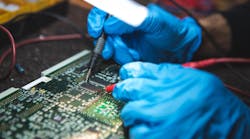Qualcomm introduced its latest integrated chip for adding Bluetooth and WiFi to mid-range cars at the Consumer Electronics Show, as the car of the future becomes one of the major battlegrounds in the global chip business. The new chip supports WiFi 5 and the latest generation of Bluetooth 5 and expands Qualcomm's lineup of wireless connectivity products to "virtually all vehicle classes."
Qualcomm said the QCA6595AU is more advanced than current WiFi 5 chips sold to car manufacturers and that it can offer data transfer speeds of up to 1 Gbps. The chip can be used to support 5 GHz WiFi throughout the car while also connecting 2.4 GHz WiFi and Bluetooth 5.1 devices to the digital dashboard, including voice and audio over wireless headphones and speakers. Qualcomm will start selling the new chip to car manufacturers in late 2020.
The chip is designed to shoot signals over both the 5 GHz and 2.4 GHz bands, offering faster data speeds so that drivers can connect smartphone apps or transfer video to the dashboard. The 28-nanometer networking chip, which can connect up to 32 WiFi devices throughout the car, also supports Bluetooth 5.1 and Qualcomm's aptX Adaptive technology for cleaner, crisper audio and voice. It can withstand temperatures ranging from -40°C to +85°C.
It also complements the other WiFi and Bluetooth chips it sells to car manufacturers. Last year, Qualcomm introduced its integrated WiFi 6 chip for cars, the QCA6696, which can offer data transfers of up to 1.8 Gbps. The chip should start shipping in cars in 2021, the company said. On the other end of the product line is the QCA6574AU, which can support data speeds of up to 870 Mbps and uses the legacy WiFi 5 and Bluetooth 5 standards.
Qualcomm, the world's largest designer of chips used in smartphones, has been trying to carve out more market share in cars since its $44 billion bid for NXP Semiconductors, the world’s largest player in automotive chips, fell through in 2018. Qualcomm has long been one of the top vendors of WiFi, Bluetooth and other chips used in the dashboard electronics as well as baseband modems that connect the car to the cloud over cellular networks.
Qualcomm, based in San Diego, California, is also trying to broaden its business as smartphone demand stalls. Last year, it amassed $600 million in sales by supplying ICs to car vendors. But the company also has more than $7 billion of orders in the pipeline for chips used in the center console of the car, up from $5.5 billion a year ago. Today, 19 of the top 25 global car manufacturers are using Qualcomm chips in dashboard displays.
The company's rivals are racing into the market for WiFi and Bluetooth chips used in cars. Last year, NXP agreed to buy out Marvell's Wi-Fi and Bluetooth connectivity business for $1.75 billion. NXP expects sales from these assets to double to around $600 million by 2022. Infineon, the second largest seller of semiconductors used in cars, agreed last year to buy Cypress Semiconductor, one of the world's top players in Wi-Fi and Bluetooth ICs, for $10.1 billion.
On top of the new WiFi and Bluetooth chip, Qualcomm introduced its Cloud-to-Car service at the Consumer Electronics Show so that manufacturers can securely and safely upgrade the car's programming from the cloud. It rolled out blueprints for building short-range radio technology into cars so they can chat with each other and infrastructure like stop lights and road signs, alerting drivers to potential collisions and other danger on the road ahead.
The cellular vehicle-to-everything or C-V2X standard can be used to broadcast data on the car's location, speed, direction and acceleration to other cars equipped with C-V2X. Drivers can be alerted when other cars are slamming on the brakes, running through red lights and stop signs, slowing down for construction, speeding around corners or swerving on slippery road surfaces. The C-V2X standard delivers 360-degree coverage of the car's surroundings.
